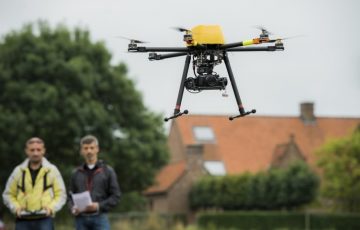Schedule a free consultation Let’s Go
FAA Compliance – Thoughts on Part 107
July 28, 2016

In the early 1900s navigating the air became a reality via balloon, airship and eventually airplane. The parallels between this era and the current unmanned aircraft system (UAS) environment are undeniable. With nothing short of a Kramer-worthy entrance, sUAS have disrupted the national airspace (NAS) in ways that have caught the Federal Aviation Administration (FAA) off guard. The FAA’s current response to regulating UAS in the NAS is the Section 333 exemption. Many of you reading this will either have or are waiting for your Section 333 exemption, thus you will understand how burdensome this process can be. All the recent excitement, and the focus of this blog post, is the announcement of the new Part 107 rules for small UAS (sUAS). The Part 107 rules go into effect in August to provide a less burdensome and clear path to operating your UAS in the NAS. It is not my intention to cover the individual changes of the new rule as many very capable people have already done so. Instead, I want to cover the bigger picture.
The new sUAS rules are a welcome change to the UAS regulatory system for many. The most significant change to the current system is the Remote Pilot Certificate (RPC) – no longer will the FAA require a manned aircraft certificate, which is an expensive and time-consuming requirement. The RPC will have a pilot license option consisting of a short learning module followed by a 35 question exam. It will also have a non-pilot option consisting of self-study, an initial knowledge test and an aeronautical knowledge test administered in an FAA authorized testing center.
This less restrictive path to operation is being praised by many, but we at Juniper Unmanned are urging caution. To illustrate this, I would like you to consider your teenage years. Remember when you acquired your first driver’s license? Did you consider yourself a competent and safe driver upon completion of the driver’s exam? Personally, I remember a couple of mailboxes that met an unfortunate demise at the mercy of my immature driving skills! This same phenomenon of permission, but with a lack of experience, will likely occur when the new Part 107 rules go into effect.
While the Part 107 regulations offers clarity and a much easier path to permission, it puts a huge responsibility (read: liability!) on the sponsoring organization and the remote pilot-in-command. However, a few items lack clarity in the Part 107 rules, including the aircraft’s “airworthiness”, which is an assessment of the aircraft’s suitability for safe flight. In addition, the FAA has not provided formal guidance regarding aircraft maintenance and inspection protocols, or on the development of an organization’s operational Standard Operating Procedures (SOP) or Safety Management Systems (SMS). These oversights are important, as they leave these critical sUAS program decisions solely in the hands of the commercial organization and its operator. Perhaps most troubling is the fact that the FAA does not provide commercial firms with specific regulations involving sUAS flight or maintenance records, which is critical information about the firm’s sUAS program operations that can be highly valuable in the event of an accident investigation or a mechanical failure.
For commercial organizations to scale and sustain sUAS program operations in a manner that is effective, safe and compliant, they require professional experience beyond what is provided in the FAA’s short learning modules and aeronautical test. The good news is that this knowledge is available from Juniper Unmanned!
In summary, Juniper’s integrated approach to enterprise sUAS program management is designed to maximize the strengths of unmanned aircraft, system sensors, and data workflows. Our goal is to optimize your operational efficiency and productivity, while maintaining compliance with the FAA’s new Part 107 rules.
Please contact us if you have any questions about the new FAA rules for sUAS – we’ll be glad to help move your organization’s sUAS program forward with our technical, business and regulatory expertise!